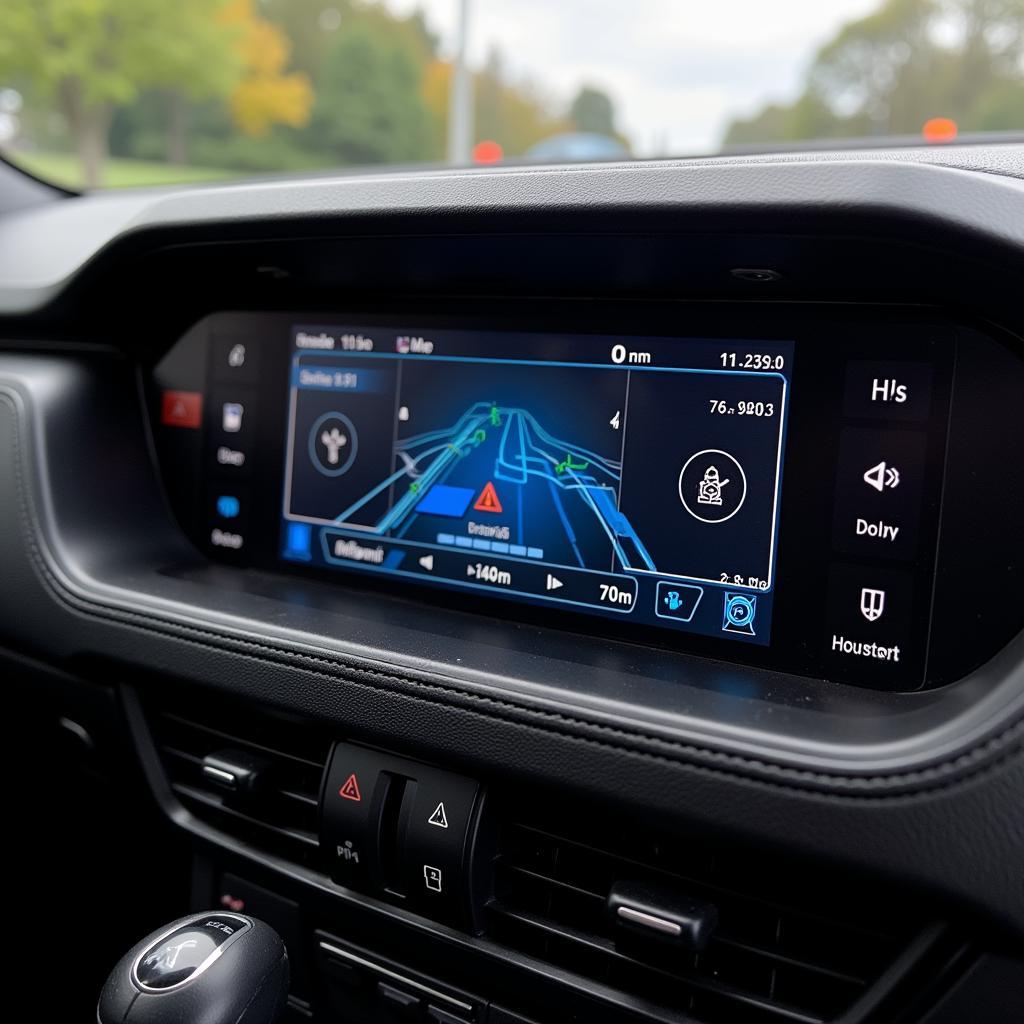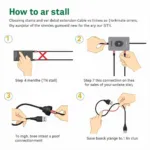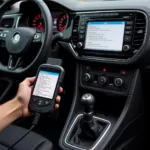The world of automotive technology is no longer limited to professional mechanics and expensive diagnostic tools. With a little ingenuity and the power of a Raspberry Pi, even casual car enthusiasts can delve into the inner workings of their vehicles. This article explores the exciting realm of Raspberry Pi non-OBD2 applications, from DIY car hacking to advanced diagnostics.
While OBD2 scanners are incredibly useful for accessing engine data, there’s a whole universe of information hidden within a car’s electronics that the standard OBD2 port doesn’t reveal. That’s where the versatility of the Raspberry Pi comes into play.
Unlocking Hidden Data Streams: Beyond the OBD2 Port
Imagine accessing real-time sensor data, controlling interior lights with a custom app, or even building your own performance dashboard. With a Raspberry Pi, these scenarios become achievable realities.
 Raspberry Pi Car Dashboard
Raspberry Pi Car Dashboard
While OBD2 provides a standardized way to communicate with a car’s engine control unit (ECU), many other electronic control units (ECUs) govern various aspects of the vehicle. These include ECUs for airbags, ABS, transmission, and even infotainment systems.
Raspberry Pi as a Powerful Diagnostic Tool
A Raspberry Pi, armed with the right software and connections, can tap into these hidden data streams, providing valuable insights into your car’s performance and health. This is particularly useful for older vehicles that predate OBD2 standardization or for enthusiasts seeking more granular data than OBD2 provides.
DIY Car Hacking: The Possibilities are Endless
The beauty of using a Raspberry Pi for non-OBD2 car projects lies in its flexibility and affordability. You can tailor it to your specific needs and interests, whether it’s:
- Data Logging and Analysis: Record and analyze sensor data to monitor performance, fuel efficiency, and identify potential issues.
- Custom Gauges and Displays: Build your own digital dashboards or head-up displays to visualize data in a way that suits your driving style.
- Enhanced Security Features: Create custom alarm systems, GPS trackers, or remote monitoring solutions.
- Comfort and Convenience Upgrades: Control your car’s windows, locks, or even climate control with a mobile app.
Choosing the Right Raspberry Pi for Your Project
The specific Raspberry Pi model you choose will depend on the complexity of your project. For basic data logging or simple control applications, a Raspberry Pi Zero W might suffice. However, for more demanding tasks like real-time data processing or complex user interfaces, a Raspberry Pi 4 with more RAM and processing power would be a better choice.
Safety and Ethical Considerations
While exploring the world of Raspberry Pi non-OBD2 car hacking is exciting, it’s crucial to prioritize safety and ethical considerations.
- Thorough Research: Always research extensively before connecting anything to your car’s electronics. Mistakes can be costly or even dangerous.
- Professional Guidance: If you’re unsure about any aspect of a project, consult with an experienced automotive electrician or electronics hobbyist.
- Legal Restrictions: Be aware of any legal restrictions related to modifying your vehicle’s electronics in your area.
Conclusion: Empowering the Future of Car Enthusiasts
Raspberry Pi non-OBD2 projects offer a fascinating window into the world of automotive technology, empowering car enthusiasts of all skill levels to understand, diagnose, and even enhance their vehicles. As cars become increasingly reliant on electronics, the role of DIY solutions and open-source platforms like Raspberry Pi will only continue to grow.
Remember to prioritize safety, ethical hacking, and responsible exploration as you embark on your own Raspberry Pi non-OBD2 adventures.
FAQ
1. Do I need to be an expert in electronics to work with Raspberry Pi for car projects?
No, while a basic understanding of electronics is helpful, there are plenty of resources and tutorials available online to guide beginners through the process.
2. Is it legal to modify my car’s electronics with a Raspberry Pi?
Laws vary by region, so it’s essential to research and understand the regulations in your area before making any modifications.
3. Where can I find reliable information and resources for Raspberry Pi car projects?
Online communities, forums, and websites dedicated to Raspberry Pi and automotive hacking are excellent sources of information, tutorials, and project ideas.
4. What are some beginner-friendly Raspberry Pi car projects to get started?
Simple projects like building a GPS tracker, a digital dashboard, or even automating your garage door are great starting points for beginners.
5. Can I use a Raspberry Pi to improve my car’s performance?
While you can monitor performance data, directly modifying your car’s engine management system with a Raspberry Pi is not recommended unless you have advanced knowledge and expertise.
Need help with your car diagnostics or looking for the right OBD2 scanner? Contact our team at WhatsApp: +1(641)206-8880, Email: [email protected]. We offer 24/7 customer support to help you find the perfect solution. You can also check out our other helpful articles on OBD2 scanners and car diagnostics on our website.

